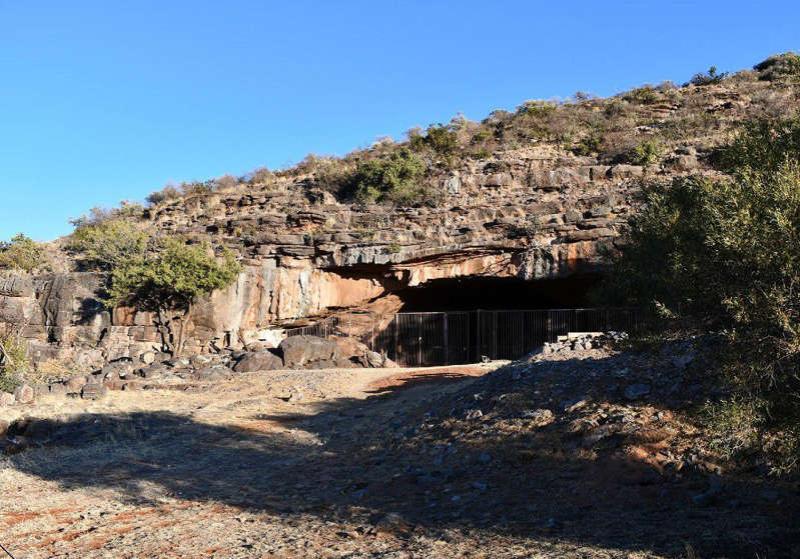Oldest evidence of human activity unearthed in African cave


A team of Canadian and Israeli researchers have unearthed the earliest evidence of human occupation in a cave, dating back about two million years until nearly modern times.
A large cave nestled in South Africa’s Kalahari Desert might be the first on Earth to have housed human activity, providing a fascinating look into human evolution while simultaneously raising more questions to answer.
By analyzing layers of soil in the Wonderwerk Cave, the researchers found some of the earliest evidence of fire use and the shift in tool-making capabilities, explained Liora Kolska Horwitz, researcher at the Hebrew University of Jerusalem’s (HU) Natural History Collection and co-director of the Wonderwerk Cave expedition that has spanned over 15 years.
“What we have here in the cave are milestones of these very dramatic events in human evolution,” she said. “I can’t think of any other site I know of, certainly not in Sub-Saharan Africa, that has a complete sequence of two million years of human occupation.”
The Wonderwerk Cave, meaning “miracle” in Afrikaans, has been the site of countless excavations and explorations since the 1940s. The cave, which stretches 140 metres long — the length of nearly 1.5 Peace Towers on Parliament Hill in Ottawa — appears to have been an important site for humans over many eras, Horowitz explained.
Its sedimentary layers provide a clear picture of how our human ancestors evolved to live, she said. In the oldest layers lies evidence of Oldowan tools — mainly sharp flakes and small, simple chopping tools. Newer layers have uncovered early hand axes over one million years ago, as well as evidence of fire use revealed through burnt bone, sediment and ash.
However, there are still many questions that linger, Horowitz said.© Provided by National Post The entrance to Wonderwerk Cave in South Africa, which housed human activity for two million years.
“We can’t say whether these people were actually making the fire, or whether they were just using fire,” she said. “But it’s still a very momentous moment in human evolution and development. Because once you have fire, it opens a whole set of new things that you can do to protect yourself.”
It’s not just Earth’s earliest hominids that occupied the Wonderwerk Cave. The last people who were there were European farmers who resided there until they built their farm house in the early 1900s, she said, adding this ability to track humans over such a long period of time is “very unique.”
Though it’s unclear how long each group stayed for over the past two million years, it’s an incredible revelation, said geologist and professor at HU’s Institute of Earth Sciences Ron Shaar, who is also lead author of the study. and Israeli researchers have unearthed the earliest evidence of human occupation in a cave, dating back about two million years until nearly modern times.
“It’s really interesting to understand how our species evolved with time,” he said. “Every evidence and clue that can shed light on very early histories is very fascinating … it’s a great feeling to be part of this.”
In terms of the cave itself, Horowitz suggests there may be special value to it. As it’s considered a very spiritual place by local communities, it’s possible it might have also held that value “from the beginnings of time.”
Because of its largeness, Horowitz said it’s possible the cave was a landmark that people recognized and kept coming back. As the region has very little rock shelters or caves, she suggested it might have also provided a spot for hunters to scout out the landscape as it looks out onto a plateau.
But since a cave atmosphere offers a very different environment, there will need to be continued collaboration among archaeologists, geologists and other scientists to determine how exactly hominids interacted with the Wonderwerk Cave.
Moving forward, it will be important to learn more about the “why”, said University of Toronto’s Michael Chazan, who is co-director of the Wonderwerk Cave project alongside Horowitz.
“So there are traces of fire, but how is the fire being used? There are stone tools, but what were they being used for?” he said. “Can we draw out more of the lives of these people at different points in time?”
There will be tinkering and testing with regard to improving the time scale the researchers have laid out, but the focus will now be on how exactly our evolution played out.
“Now, it’s all about how we can put together a coherent picture of how life changed over this unbelievably immense period of time,” he said. “We don’t understand their lives by a long shot. There are so many questions — far more than answers — but by working and collaborating together we’re able to make a step forward.”




Who knows maybe some of our ancestors stayed there at some point
The more research, the more knowledge we gain. Love this stuff
I love this stuff. Two million years, amazing, just amazing.
“We can’t say whether these people were actually making the fire, or whether they were just using fire,”
Can you imagine being the first human to make fire.
"OMG" would be an understatement. lol
Followed shortly by OW OW OW OWWW
lol
Fantastic. Thanks for posting this article.
You are welcome